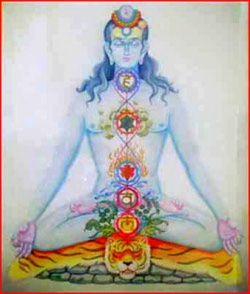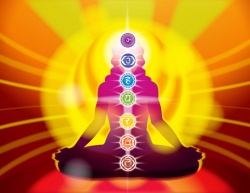Difference between revisions of "Psycho-physical system"
m (1 revision: \Adminos rigpa) |
|||
| (2 intermediate revisions by the same user not shown) | |||
| Line 1: | Line 1: | ||
[[File:1795 3.jpg|thumb|250px|]][[File:Chakras447.jpg|thumb|250px|]] | [[File:1795 3.jpg|thumb|250px|]][[File:Chakras447.jpg|thumb|250px|]] | ||
| − | + | ||
| − | *channels or ''[[tsa]]'' (Wyl. ''[[rtsa]]''; Skt. ''[[nadi]]''), | + | |
| − | *wind-energies or ''[[inner air|lung]]'' (Wyl. ''[[rlung]]''; Skt. ''[[prāṇa]]''), and | + | |
| − | *essences or ''[[tiklé]]'' (Wyl. ''[[thig le]]''; Skt. ''[[bindu]]''). | + | |
| + | |||
| + | |||
| + | |||
| + | [[Psycho-physical system]]– the {{Wiki|subtle}} system of | ||
| + | *[[channels]] or ''[[tsa]]'' ([[Wyl.]] ''[[rtsa]]''; Skt. ''[[nadi]]''), | ||
| + | *[[wind-energies]] or ''[[inner air|lung]]'' ([[Wyl.]] ''[[rlung]]''; Skt. ''[[prāṇa]]''), and | ||
| + | *[[essences ]]or ''[[tiklé]]'' ([[Wyl.]] ''[[thig le]]''; Skt. ''[[bindu]]''). | ||
''[[The Tibetan Book of Living and Dying]]'' says: | ''[[The Tibetan Book of Living and Dying]]'' says: | ||
| − | :The [[Tantric Buddhist]] tradition of Tibet offers an explanation of the body that is quite different from the one most of us are used to. This is of a [[psycho-physical system]], which consists of a dynamic network of [[subtle channels]], | + | :The [[Tantric Buddhist]] [[tradition]] of [[Tibet]] offers an explanation of the [[body]] that is quite different from the one most of us are used to. This is of a [[psycho-physical system]], which consists of a dynamic network of [[subtle channels]], “[[winds]]” or [[inner air]], and [[essences]]. We are familiar with something similar in the [[meridians]] and ''[[Wikipedia:Qi|ch’i]]'' [[energy]] of {{Wiki|Chinese medicine}} and {{Wiki|acupuncture}}. |
| − | :The human body is compared by the masters to a city, the channels to its roads, the winds to a horse, and the mind to a rider.<ref>[[Sogyal Rinpoche]], ''The Tibetan Book of Living and Dying'', revised and updated edition, Harper San Francisco and London: Rider, 2002, page 252.</ref> | + | :The [[human body]] is compared by the [[masters]] to a city, the [[channels]] to its roads, the [[winds]] to a [[horse]], and the [[mind]] to a rider.<ref>[[Sogyal Rinpoche]], ''[[The Tibetan Book of Living and Dying]]'', revised and updated edition, Harper {{Wiki|San Francisco}} and {{Wiki|London}}: Rider, 2002, page 252.</ref> |
| − | ==Channels== | + | ==[[Channels]]== |
{{:subtle channels}} | {{:subtle channels}} | ||
| − | ==Wind-Energies or [[Inner Air]]== | + | ==[[Wind-Energies]] or [[Inner Air]]== |
| − | Through these channels flow the winds, or [[inner air]]. There are [[five root winds|five root]] and [[five branch winds]]. Each of the root winds supports an [[five elements|element]] and is responsible for a function of the human body. The branch winds enable the senses to operate. The winds that flow in the central channel are called 'wisdom winds'. The winds that flow in all the other channels except the central channel are said to be impure, and to activate negative dualistic thought patterns. | + | Through these [[channels]] flow the [[winds]], or [[inner air]]. There are [[five root winds|five root]] and [[five branch winds]]. Each of the [[root]] [[winds]] supports an [[five elements|element]] and is responsible for a [[function]] of the [[human body]]. The branch [[winds]] enable the [[senses]] to operate. The [[winds]] that flow in the [[central channel]] are called '[[wisdom winds]]'. The [[winds]] that flow in all the other [[channels]] except the [[central channel]] are said to be impure, and to activate negative [[dualistic]] [[thought]] patterns. |
| − | ==Essences== | + | ==[[Essences]]== |
| − | The | + | The “[[essences]]” are contained within the [[channels]]. There are [[red]] and white [[essences]]. The [[principal]] seat of the white [[essence]] is the {{Wiki|crown}} of the head, and of the [[red]] [[essence]] at the [[navel]]. |
{{reflist}} | {{reflist}} | ||
| Line 23: | Line 30: | ||
==Further Reading== | ==Further Reading== | ||
| − | *[[Jamgön Kongtrul]], ''The [[Treasury of Knowledge]]'', ''Book Six, Part Four: Systems of Buddhist Tantra'', '' '9. The Nature of the Body' '' (Ithaca: Snow Lion, 2005), pages 169-85. | + | *[[Jamgön Kongtrul]], ''The [[Treasury of Knowledge]]'', ''[[Book]] Six, Part Four: Systems of [[Buddhist Tantra]]'', '' '9. The [[Nature]] of the [[Body]]' '' (Ithaca: Snow Lion, 2005), pages 169-85. |
| − | *[[Sogyal Rinpoche]], ''[[The Tibetan Book of Living and Dying]]'', revised and updated edition (HarperSanFrancisco and London: Rider, 2002), pages 251-52. | + | *[[Sogyal Rinpoche]], ''[[The Tibetan Book of Living and Dying]]'', revised and updated edition (HarperSanFrancisco and {{Wiki|London}}: Rider, 2002), pages 251-52. |
| − | *[[Tulku Thondup]], ''Enlightened Journey'' (Boston & London: Shambhala, 1995), pages 207-212. | + | *[[Tulku Thondup]], ''[[Enlightened]] Journey'' ([[Boston]] & {{Wiki|London}}: [[Shambhala]], 1995), pages 207-212. |
{{RigpaWiki}} | {{RigpaWiki}} | ||
[[Category:Psycho-physical System]] | [[Category:Psycho-physical System]] | ||
Latest revision as of 18:46, 25 November 2023
Psycho-physical system– the subtle system of
- channels or tsa (Wyl. rtsa; Skt. nadi),
- wind-energies or lung (Wyl. rlung; Skt. prāṇa), and
- essences or tiklé (Wyl. thig le; Skt. bindu).
The Tibetan Book of Living and Dying says:
- The Tantric Buddhist tradition of Tibet offers an explanation of the body that is quite different from the one most of us are used to. This is of a psycho-physical system, which consists of a dynamic network of subtle channels, “winds” or inner air, and essences. We are familiar with something similar in the meridians and ch’i energy of Chinese medicine and acupuncture.
- The human body is compared by the masters to a city, the channels to its roads, the winds to a horse, and the mind to a rider.[1]
Channels
There are 72,000 subtle channels in the body, but the three principal ones are:
- the central channel (Skt. avadhūtī; Tib. uma; Wyl. dbu ma), running parallel to the spine,
- the right channel (Skt. rasanā; Tib. roma; Wyl. ro ma) and
- the left channel (Skt. lalanā; Tib. kyangma; Wyl. rkyang ma), which run either side of the central channel.
The right and left channels coil around the central one at a number of points to form a series of "knots". Along the central channel are situated a number of “channel wheels,” the chakras or energy-centers, from which channels branch off like the ribs of an umbrella.
Wind-Energies or Inner Air
Through these channels flow the winds, or inner air. There are five root and five branch winds. Each of the root winds supports an element and is responsible for a function of the human body. The branch winds enable the senses to operate. The winds that flow in the central channel are called 'wisdom winds'. The winds that flow in all the other channels except the central channel are said to be impure, and to activate negative dualistic thought patterns.
Essences
The “essences” are contained within the channels. There are red and white essences. The principal seat of the white essence is the crown of the head, and of the red essence at the navel.
Footnotes
- ↑ Sogyal Rinpoche, The Tibetan Book of Living and Dying, revised and updated edition, Harper San Francisco and London: Rider, 2002, page 252.
Further Reading
- Jamgön Kongtrul, The Treasury of Knowledge, Book Six, Part Four: Systems of Buddhist Tantra, '9. The Nature of the Body' (Ithaca: Snow Lion, 2005), pages 169-85.
- Sogyal Rinpoche, The Tibetan Book of Living and Dying, revised and updated edition (HarperSanFrancisco and London: Rider, 2002), pages 251-52.
- Tulku Thondup, Enlightened Journey (Boston & London: Shambhala, 1995), pages 207-212.

